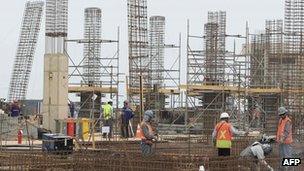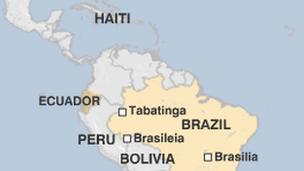Haitians in Brazil get visas but border checks increase
- Published

Major building projects in Brazil are creating a demand for labourers
Brazil is granting residence visas to some 4,000 Haitians already in the country but is stepping up border checks to stem a further influx.
The move follows an increase in migrants leaving Haiti to seek work in Brazil's booming economy.
Many arrive in remote border towns after being brought to South America by people-smugglers and trekking through the jungles of Peru and Bolivia.
Haiti is still struggling to recover from the January 2010 earthquake.
The Brazilian Justice Ministry announced on Tuesday that some 4,000 Haitians who had arrived in the country since the devastating quake would be granted residence and work visas.
These include 1,600 migrants who had already been authorised to stay and some 2,000 more who are in the country illegally.
But the Brazilians authorities stressed that this was a one-off move.

From now on, Haitians would need to apply at the Brazilian embassy in Port-au-Prince for one of the 100 work visas available per month, officials said.
"The government will not be indifferent to the Haitians' vulnerable economic situation. But those who don't have a visas will not be allowed into Brazil," said Justice Minister Jose Eduardo Cardozo.
The Brazilian authorities say they are also reinforcing border checks and will talk to neighbouring governments on ways of tackling people-smuggling.
Many migrants flew to Ecuador and then were taken by traffickers through Peru or Bolivia.
Most of the Haitians have been gathering in the towns of Tabatinga and Brasilieia, the French news agency AFP reports.
Demand for manual labourers is strong in Brazil, where there are infrastructure and building projects under way, many linked to the planned 2014 World Cup and the 2016 Olympic Games being held in the country.
- Published9 January 2012
- Published8 January 2012
- Published25 December 2011
- Published6 September 2011